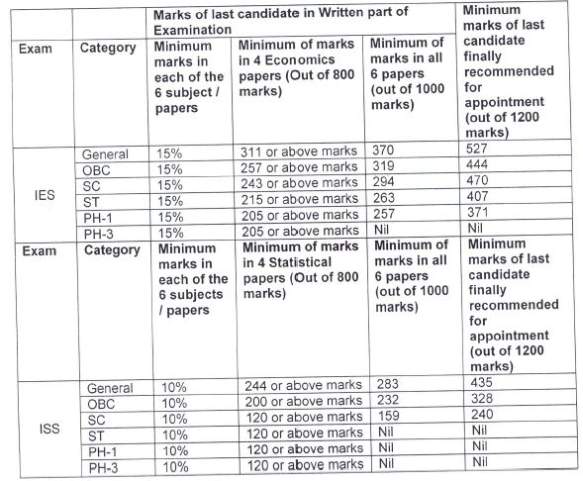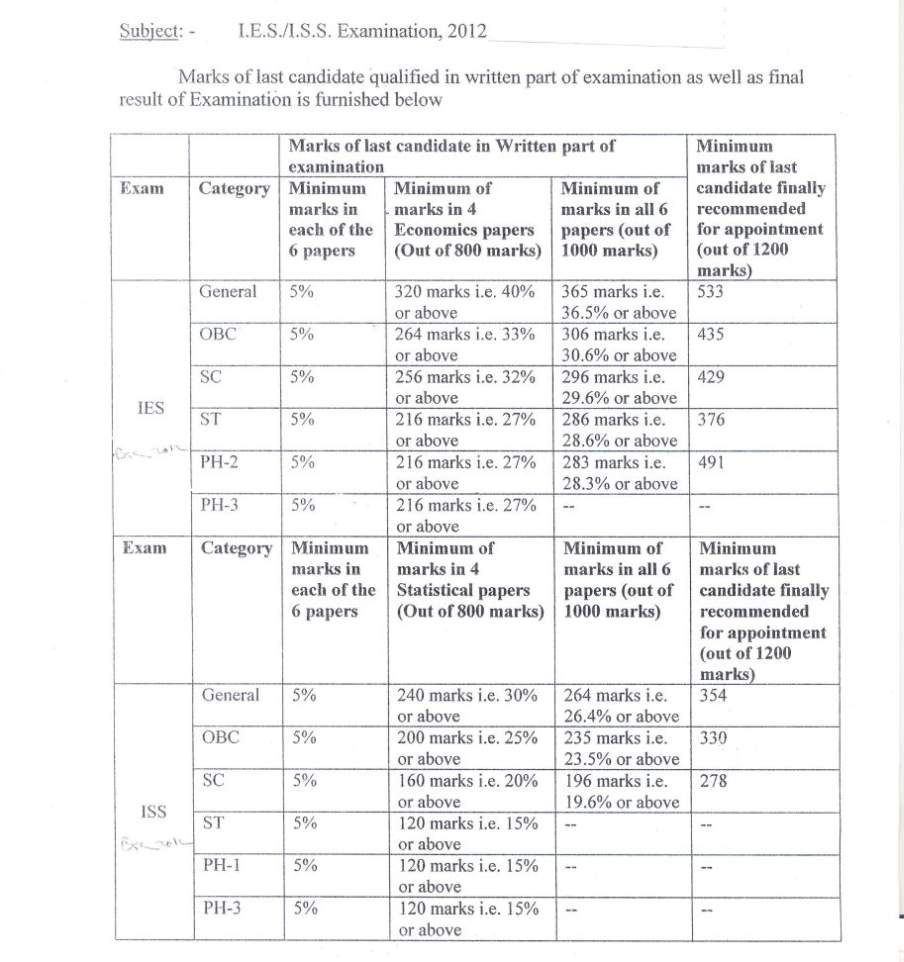|
#2
19th August 2014, 09:28 AM
| |||
| |||
| Re: Indian Engineering Service previous year cut off of Civil Engineering
As you want to get the Indian Engineering Service previous year cut off of Civil Engineering so here it is for you: Indian Engineering Service previous year cut off of Civil Engineering:   Here for your reference I am giving you the syllabus of IES of Civil Engineering: Paper I 1. BUILDING MATERIALS Timber: Different types and species of structural timber, density-moisture relationship, strength in different directions, defects, influence of defects on permissible stress, preservation, dry and wet rots, codal provisions for design, Plywood. Bricks: Types, Indian Standard classification, absorption, saturation factor, strength in masonry, influence of morter strength on masonry strength. Cement: Compounds of, different types, setting times, strength. Cement Mortar: Ingredients, proportions, water demand, mortars for plastering and masonry. Concrete: Importance of W/C Ratio, Strength, ingredients including admixtures, workability, testing for strength, elasticity, non-destructive testing, mix design methods. 2. SOLID MECHANICS Elastic constants, stress, plane stress, Mohr’s circle of stress, strains, plane strain, Mohr’s circle of strain, combined stress; Elastic theories of failure; Simple bending, shear; Torsion of circular and rectangular sections and simple members. 3. STRUCTURAL ANALYSIS Analysis of determinate structures - different methods including graphical methods. Analysis of indeterminate skeletal frames - moment distribution, slope-deflection, stiffness and force methods, energy methods, Muller-Breslau principle and application. Plastic analysis of indeterminate beams and simple frames - shape factors. 4. DESIGN OF STEEL STRUCTURES Principles of working stress method. Design of connections, simple members, Built-up sections and frames, Design of Industrial roofs. Principles of ultimate load design. Design of simple members and frames. 5. DESIGN OF CONCRETE AND MASONRY STRUCTURES Limit state design for bending, shear, axial compression and combined forces. Codal provisions for slabs, beams, walls and footings. Working stress method of design of R.C. members. Principles of prestressed concrete design, materials, methods of prestressing, losses. Design of simple members and determinate structures. Introductions to prestressing of indeterminate structures. Design of brick masonry as per I.S. Codes. 6. CONSTRUCTION PRACTICE, PLANNING AND MANAGEMENT Concreting Equipment: Weight Batcher, Mixer, vibrator, batching plant, concrete pump. Cranes, hoists, lifting equipment. Earthwork Equipment: Power shovel, hoe, dozer, dumper, trailers and tractor, rollers, sheep foot rollers, pumps. Construction, Planning and Management: Bar chart, linked bar chart, work-break down structures, Activity - on - arrow diagrams. Critical path, probabilistic Activity durations; Event-based networks. PERT network: Time-cost study, crashing; Resource allocation. Paper II 1 A. FLUID MECHANICS, OPEN CHANNEL FLOW, PIPE FLOW Fluid Properties, Pressure, Thrust, Buoyancy; Flow Kinematics; Integration of flow equations; Flow measurement; Relative motion; Moment of momentum; Viscosity, Boundary layer and Control, Drag, Lift; dimensional Analysis, Modelling; Cavitation; Flow oscillations; Momentum and Energy principles in Open channel flow, Flow controls, Hydraulic jump, Flow sections and properties; Normal flow, Gradually varied flow; Surges; Flow development and losses in pipe flows, Measurements; Siphons; Surges and Water hammer; Delivery of Power Pipe networks. 1 B. HYDRAULIC MACHINES AND HYDROPOWER Centrifugal pumps, types, performance parameters, scaling, pumps in parallel; Reciprocating pumps, air vessels, performance parameters; Hydraulic ram; Hydraulic turbines, types, performance parameters, controls, choice; Power house, classification and layout, storage, pondage, control of supply. 2 A. HYDROLOGY Hydrological cycle, precipitation and related data analyses, PMP, unit and synthetic hydrographs; Evaporation and transpiration; Floods and their management, PMF; Streams and their gauging; River morphology; Routing of floods; Capacity of Reservoirs. 2 B. WATER RESOURCES ENGINEERING Water resources of the globe: Multipurpose uses of Water: Soil-Plant-Water relationships, irrigation systems, water demand assessment; Storages and their yields, ground water yield and well hydraulics; Waterlogging, drainage design; Irrigation revenue; Design of rigid boundary canals, Lacey’s and Tractive force concepts in canal design, lining of canals; Sediment transport in canals; Non-Overflow and overflow sections of gravity dams and their design, Energy dissipators and tailwater rating; Design of headworks, distribution works, falls, cross-drainage works, outlets; River training. ENVIRONMENTAL ENGINEERING 3 A. WATER SUPPLY ENGINEERING Sources of supply, yields, design of intakes and conductors; Estimation of demand; Water quality standards; Control of Water-borne diseases; Primary and secondary treatment, detailing and maintenance of treatment units; Conveyance and distribution systems of treated water, leakages and control; Rural water supply; Institutional and industrial water supply. 3 B. WASTE WATER ENGINEERING Urban rain water disposal; Systems of sewage collection and disposal; Design of sewers and sewerage systems; pumping; Characteristics of sewage and its treatment, Disposal of products of sewage treatment, streamflow rejuvenation Institutional and industrial sewage management; Plumbing Systems; Rural and semi-urban sanitation. 3 C. SOLID WASTE MANAGEMENT Sources, classification, collection and disposal; Design and Management of landfills. 3 D. AIR AND NOISE POLLUTION AND ECOLOGY Sources and effects of air pollution, monitoring of air pollution; Noise pollution and standards; Ecological chain and balance, Environmental assessment. 4 A. SOIL MECHANICS Properties of soils, classification and interrelationship; Compaction behaviour, methods of compaction and their choice; Permeability and seepage, flow nets, Inverted filters; Compressibility and consolidation; Shearing resistance, stresses and failure; soil testing in laboratory and in-situ; Stress path and applications; Earth pressure theories, stress distribution in soil; soil exploration, samplers, load tests, penetration tests. 4 B. FOUNDATION ENGINEERING Types of foundations, Selection criteria, bearing capacity, settlement, laboratory and field tests; Types of piles and their design and layout, Foundations on expansive soils, swelling and its prevention, foundation on swelling soils. 5 A. SURVEYING Classification of surveys, scales, accuracy; Measurement of distances - direct and indirect methods; optical and electronic devices; Measurement of directions, prismatic compass, local attraction; Theodolites - types; Measurement of elevations - Spirit and trigonometric levelling; Relief representation; Contours; Digital elevation modelling concept; Establishment of control by triangulations and traversing - measurements and adjustment of observations, computation of coordinates; Field astronomy, Concept of global positioning system; Map preparation by plane tabling and by photogrammetry; Remote sensing concepts, map substitutes. 5 B. TRANSPORTATION ENGINEERING Planning of highway systems, alignment and geometric design, horizontal and vertical curves, grade separation; Materials and construction methods for different surfaces and maintenance: Principles of pavement design; Drainage. Traffic surveys, Intersections, signalling: Mass transit systems, accessibility, networking. Tunnelling, alignment, methods of construction, disposal of muck, drainage, lighting and ventilation, traffic control, emergency management. Planning of railway systems, terminology and designs, relating to gauge, track, controls, transits, rolling stock, tractive power and track modernisation; Maintenance; Appurtenant works; Containerisation. Harbours - layouts, shipping lanes, anchoring, location identification; Littoral transport with erosion and deposition; sounding methods; Dry and Wet docks, components and operational Tidal data and analyses. Airports - layout and orientation; Runway and taxiway design and drainage management; Zoning laws; Visual aids and air traffic control; Helipads, hangers, service equipment. Contact Details: Union Public Service Commission UPSC, Man Singh Road Area, New Delhi, Delhi 110069 India Map Location: [MAP]https://www.google.co.in/maps?q=`+Public+Service+Commision,+UPSC,+Man+Singh +Road+Area,+New+Delhi,+Delhi&hl=en&ll=28.608656,77 .227728&spn=0.009513,0.013046&sll=23.814107,86.441 138&sspn=0.009914,0.013046&oq=`+Pu&t=m&z=16&iwloc= A[/MAP] |
